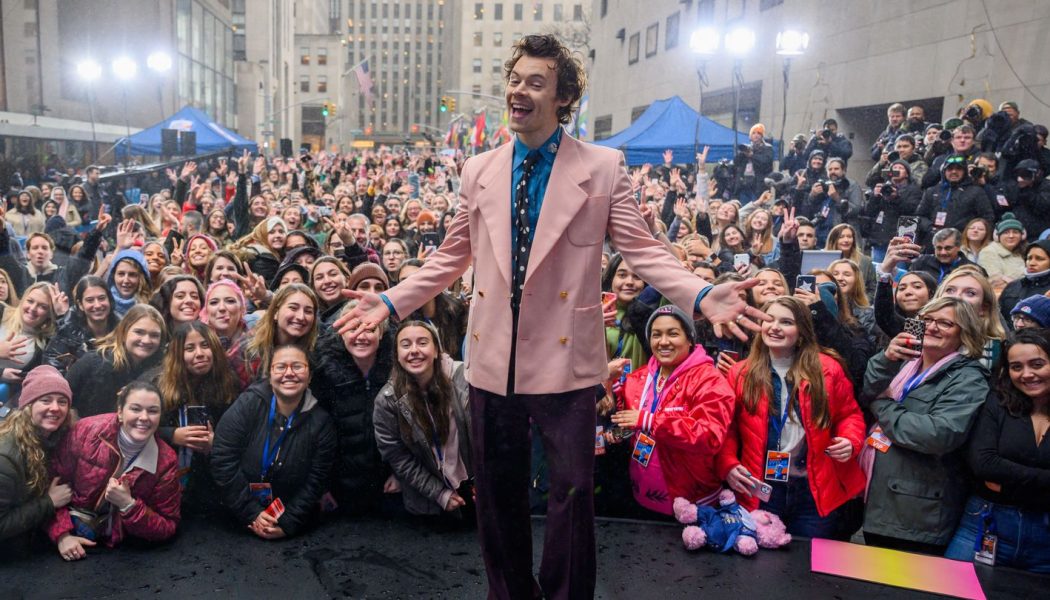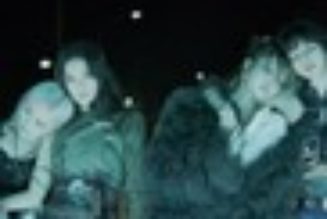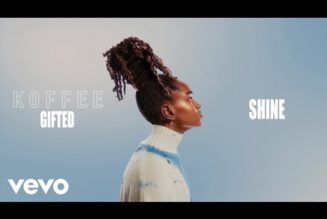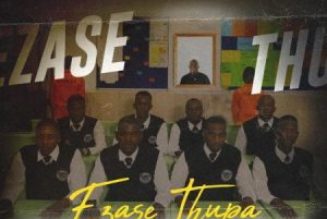
By Larisha Paul
For years, the embroidery machine that sisters Sara and Mari Olson had been gifted many Christmases ago sat collecting dust in their Wisconsin bedroom, while neither of them learned how to use it. After they’d spent the better part of 2020 at home without much to do amid the trying times of the COVID-19 pandemic, the time seemed right to try it out.
Sara and Mari, 21 and 18, respectively, began adorning T-shirts and crewnecks with designs relating to Harry Styles and a few of his One Direction bandmates, including Niall Horan and Louis Tomlinson. They found a hungry customer base for their products: a white T-shirt with “Watermelon Sugar” designed into a pair of red sunglasses, Horan’s album title Heartbreak Weather placed on a blue crewneck, and rainbow stickers that read “Be Nice to Nice.” Since launching it on May 20, their Etsy shop Kiwi Crossings has become a full-time small-business operation consisting of long days creating products, packaging orders, and making trips to the post office to ship them off.
With over 900 sales in just three months, Kiwi Crossings has brought in more in revenue than what Sara would have earned at her full-time job in the same amount of time. But as President Trump opposes providing the much-needed $25 billion in funding for the pandemic-damaged United States Postal Service, causing delays in delivery times and an increase in service pricing, Sara and Mari wonder how much longer they’ll be able to keep their shop running. “Not only would it be harder for us to get our packages out because we’re in a small town, but we would also be spending an arm and a leg,” Sara tells MTV News. “We would probably have to shut down, to be honest.”
Kiwi Crossings is just one of a growing number of fan-made merchandise shops that have sprung up over the past few months, both independently and on Etsy, offering fans an alternative to products offered on artists’ official merch sites that tend to be pricer and lack more creatively eye-catching designs. The impact of the loss of access to USPS would not only extend to these young, predominantly female small-business owners, but also to the fans who rely on these shops for access to thoughtful merchandise representing their favorite artists.
“As fans, we really look forward to merch. It’s a huge part of the music culture, how we express ourselves and what we love,” says Ariana Gonzales, 21, who cherishes the merch she’s collected from every Styles show she has attended. With the excitement that surrounded Styles’s beachy music video for “Watermelon Sugar,” fans had high expectations when the singer’s camp released limited-edition merch for the single. But for some, the products didn’t match the hype. “I was taken aback when I saw the same photo they used for the shirt stamped onto another shirt, a tote bag, and a beach towel. It’s honestly just disappointing,” Gonzales adds.
“Maybe it’s because I’ve been exposed to different merch, but it was not up to the standard set by the merch released during [Styles’s] first album,” says Mehru Baig, 17, referencing the Rubik’s Cube tote bags that replicated his tour graphics and “Kiwi” crewnecks with lyrics embroidered on the sleeves. “The prices on Harry’s shop after shipping and sales taxes are really high, and for a high school senior like me, it can be really overwhelming.” Despite being dissatisfied with Styles’s merchandise throughout the Fine Line era, fans are still purchasing the official items as they drop, just to say they have them.
“Everyone’s like, ‘I hate it, but I still need it.’ And you still need it because you want to support him, and that’s so sweet, but imagine if that money went to a better cause or could support [a small business],” says Tahira Resalat, 23, who runs her hand-drawn illustration-based product shop TeeCaake out of [her home in] London. Resalat’s shop displays her artwork — typically images of Styles’s most notable outfits as well as designs of fashionable and empowering women — on notebooks, mugs, and phone cases. Businesses like Resalat’s often expand the range of products available to fans beyond the baseline of shirts and hoodies.
“With [fan] shops, you get so much more for your money,” says Emily Uribe, 20. “And a lot of these small businesses are donating to Black Lives Matter, they’re donating to Yemen, they’re actually giving the money to something.”
For fans who don’t have the disposable income needed to frequently purchase expensive sweatshirts and water bottles from an official merch shop, design and creativity are key when making decisions to shop outside official merchandise stores. “Unofficial merch is often produced by real fans, people who know what we would like to see and what we really want to spend our money on, since they’re part of the fandom,” says Seren Aslan, 20, who recalled the delay in the delivery of her blue “Treat People With Kindness” sweatshirt. While many of these shops are Harry-centric, the desire for more representative and accessible merch seems universal across fandoms. Digital shop owners are receiving requests to expand into designing products around other artists as well, like Ariana Grande and Shawn Mendes.
When Alaina Zamani, 20, launched her shop Hun in the Sun on May 31, she had the added advantage of fandom to back her designs. “I was a hardcode Harry Styles fan and I didn’t want to be wearing his name or his face,” Zamani says. “I went for something a little more subtle or something a bit cooler, but it’s also his merch.” After releasing a collection of shirts and hoodies inspired by Travis Scott’s popular Astroworld merchandise, Zamani released her latest series, A Ride Like No Other, featuring illustrations of Styles’s vintage car collection with a “Do You Know Who You Are?” billboard in the background — the “Lights Up” lyric and Styles’s white 1966 Mercedes-Benz 230SL would stand out to his fans but go completely over the head of a casual listener. Hun in the Sun, which is based in London, has brought in around £6,000 — about $8,000 — in just two months with prices averaging $30 for shirts and $40 for crewnecks.
Erika Hernandez, 18, took a similar approach when she released a crossover collection of sweaters, hoodies, and stickers merging Styles’s Fine Line album and Netflix’s Stranger Things via her California-based operation, The Shop by Erika. “There are so many shops selling embroidered sweaters, there is some sort of competition there,” Hernandez says. TikTok videos showing the design and packaging process of these Harry Styles-themed products have gone viral time and time again, racking up hundreds of thousands of views and growing business owners’ customer bases while also inspiring some viewers to launch their own shops. Aided by fans uploading their own unboxing videos, Hernandez’s shop has 11,400 followers on the app, while others like Kiwi Crossings and Shop Sunflowers range in size from 3,500 to 61,500, respectively.
With increased demand and an increasingly oversaturated market, innovation is necessary to stay afloat. “I’m trying to think of new ways to make unique stuff and stand out, because now we’re all at the same level,” Hernandez says. She’s already begun researching other fan bases to see which artists would be a good fit for her expanding operation. Mass success has come surprisingly quickly for many merch creators, but the looming risk of losing access to USPS has them thinking about the threat of losing out on turning their businesses into full-on brands. Postmaster General Louis DeJoy’s cost-cutting tactics, like limiting overtime hours for mail carriers and removing high-speed letter processing machines from office locations, have led to weeks-long delays and disruptions in mail delivery across the country in addition to possible post office closings.
Some creators, like Resalat, ultimately dream of the day when their creative pursuits can become truly collaborative with the artists that inspire them. “I want there to be longevity in my brand. They’re Harry Styles-inspired works, but it’s not a Harry Styles fan shop. He’s helped change my life in the course of a few months by me creating some artwork inspired by him. He’s been my muse,” Resalat says. “If he supported any of these young creators who are working so hard to run these shops and be in some sort of collaboration with them, it would just be so amazing.”










